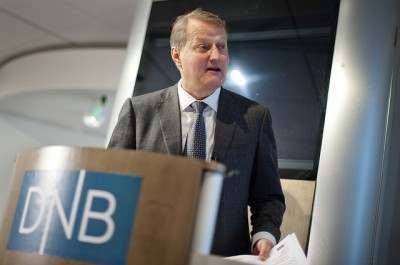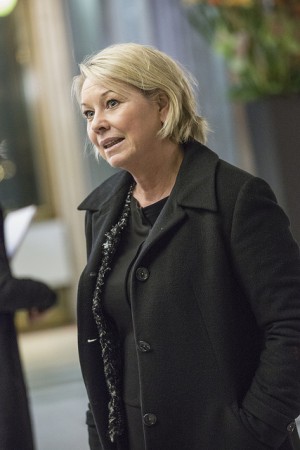Reaction has been loud and swift after Oslo newspaper Aftenposten revealed how Norway’s biggest bank, DNB, made it possible for wealthy customers to avoid taxes. DNB’s chief executive Rune Bjerke, who has close ties to the Labour Party, is facing calls for his resignation and the scandal is already having political consequences.

Customers say they’re disgusted and angry, government officials and state authorities express a sense of betrayal and newspapers were editorializing on Tuesday that DNB has violated the confidence of both politicians, taxpayers and customers who supported the bank during challenging times. Oslo newspaper Aftenposten, which revealed DNB’s highly questionable “private banking” operations through its participation in the international “Panama Papers” investigation, reported on Tuesday that even some of the bank’s wealthy customers claimed they didn’t know their accounts had wound up in tax havens.
The Norwegian state, which conducts an ongoing if unsuccessful battle against tax evasion and corruption, remains the largest shareholder in DNB after bailing the bank out of technical insolvency in the early 1990s. Norway’s former Labour-led left-center government also stepped in quickly to back DNB and other local banks during the finance crisis in 2008. Bjerke himself had been appointed CEO just the year before, when the former “best man” at his wedding, Prime Minister Jens Stoltenberg, led the government and the two were in close touch when liquidity was under threat. Bjerke, a former Labour politician himself, was hired by DNB’s board, but the government as major shareholder plays a role in who sits on the board and thus has some influence.
‘Under the radar,’ and under fire
Now Bjerke is literally under fire after claiming that he wasn’t aware of how DNB’s “private banking” unit in Luxembourg was really operating. Its practice, revealed in the so-called “Panama Papers” leaked from the Mossack Fonseca law firm in Panama, of paying the law firm to set up so-called “post box companies” in tax havens “went under the radar” of Bjerke’s management team, the board and the bank’s internal accountants, according to Bjerke. He claims he simply didn’t know what was going on.
Such ignorance may be grounds for resignation itself, suggested some commentators and analysts on Tuesday, but it’s the sheer violation of the state’s campaign against tax havens that upsets many people the most. Comments like “I expect heads to roll” and “we should chase them all out” were flourishing among customers, many of whom declared they’d be taking their business elsewhere. Bjerke told Aftenposten he “could understand our customers are disappointed.”

The government minister now in charge of the state’s investment in DNB, Monica Mæland of the Conservative Party, said she was “extremely surprised” over DNB’s Luxembourg operations not least because DNB and all companies doing business internationally in which the state has a stake are “expected to avoid use of tax havens,” according to stated policy. There’s still no proof that taxes actually have been avoided, or that anything illegal has occurred, “but DNB itself has expressed that they shouldn’t have done this (make tax evasion possible), and I completely agree with that,” Mæland told newspaper Dagens Næringsliv (DN).
Finance Minister Siv Jensen of the conservative Progress Party was also surprised and concerned, while the head of the Norwegian tax authority Skatteetaten, Hans Christian Holte, quickly requested the names of those holding accounts in the shell companies DNB administers for them in the Seychelles. “We are generally interested in information about income and fortunes abroad,” Holte told Aftenposten. DNB officials claimed they want to cooperate with the tax authorities and would “share what we can.”
Aftenposten still isn’t releasing the names of the roughly 45 Norwegian customers reportedly holding accounts in the Seychelles set up through DNB Luxembourg. Aftenposten promised anonymity to those revealed in documents received via the “Panama Papers” leak, in return for getting them to share their stories about their investments and contact with DNB. Aftenposten also claimed on Tuesday that none of those involved holds any “central positions” in Norwegian society that would be relevant to the public trust. Several of those who agreed to talk to Aftenposten claimed they were unaware of companies set up on their behalf, and those who were claimed they didn’t know the companies were supplied with share capital or board members though the Mossack Fonseca law firm in Panama.
Scolded over Luxembourg nine years ago
Among those most surprised by the trouble DNB has gotten itself into was former Norwegian Finance Minister Kristin Halvorsen. She served in the Stoltenberg government and Norwegian Broadcasting (NRK) reported how she scolded DNB already in 2007 over its Luxembourg operations. NRK and other media had run stories at the time about how DNB was marketing its “private banking” services as “discreet” and in such a way that “there’s no doubt this is a way to hide money abroad,” Halvorsen told NRK at the time. “It’s like encouraging people to do something illegal. Regardless, I expect DNB to stop making this offer.”
She told NRK Monday evening that she was “very surprised DNB didn’t act” on her concerns over the prospects of hiding money abroad. Bjerke, confronted with the warning from the finance minister issued around the time he took over, said he thought Halvorsen simply didn’t like DNB Luxembourg’s choice of wording in its promotions, and that it was changed.
Bjerke still has a lot of explaining to do, also as to why the leader of DNB Luxembourg’s office since 2006, Håkon Hansen, was promoted just a few months ago to take over as head of “private banking” for all of DNB. DN reported Tuesday that Hansen replaced the former head of DNB Private Banking from January 1, but that Hansen won’t comment on the information leaked in the “Panama Papers.” Bjerke refused to answer DN’s question on whether he still has confidence in Hansen, indicating Hansen’s role will be part of DNB’s own internal investigation into the tax haven operations.
Bad for the opposition Labour Party, too
The internal investigation isn’t likely to satisfy those upset and angry over the practices to which DNB already has admitted. Financial and tax authorities are already launching their own inquiries, Minister Mæland is answerable to Parliament and the situation is also bad for the opposition Labourt Party, since Bjerke is “one of their own.” Marte Gerhardsen, a granddaughter of Norway’s legendary Labour Prime Minister Einar Gerhardsen who leads the think tank Agenda that’s linked to Labour, predicted that DNB’s tax haven problem will have consequences.
“I think these revelations will lead to higher consciousness and reveal holes in laws and grey areas,” Gerhardsen, who was a director at DNB herself from 2011-2014, told newspaper Dagsavisen. She was at least somewhat consoled that DNB officials “admit they’ve made a mistake and that they won’t do this again.” Other Members of Parliament for Labour are unhappy over the scandal at DNB as well.
It would be “natural” for heads to roll on the top executive floor at DNB, according to Professor Petter Gottschalk of the Norwegian Business School BI. He told radion station P4 on Monday that it would “a very important symbolic move” by Bjerke, “today or in the course of the week, to resign as chief executive officer of DNB. Then all the other DNB employees will understand how serious this is.”
Professor Tor W Andreassen at the Norwegian business school NHH (Norges Handelshøyskole) noted that the tax haven scandal is the latest in a long line of events that make DNB seem “greedy.” He noted how DNB was quick to raise interest rates on mortgages when the central bank hiked its key policy rate, but slow to lower them when rates started to fall. DNB has long been known for charging high fees, compared to many other smaller banks in Norway. Andreassen also recalled how Bjerke caught huge criticism when he justified higher loan rates and cost-cutting at the bank as part of a spleiselag (joint effort) to keep the bank strong, while he and his fellow top executives ended up pocketing large bonuses when the bank reported huge profits.
“If the bank has also contributed towards tax evasion, it’s completely at odds with Norwegian norms,” Andreassen, who specialized in studying service-related businesses and customer relations, told Aftenposten. “The sum of it all is that it creates an impression of a bad culture at DNB, and a management problem.”
newsinenglish.no/Nina Berglund

